The heat is on

There has been a heated welcome for the new chief heat officer in Dhaka. Comments started pouring in as scores of people rushed to judge and ridicule the appointment of an official who will oversee a heat action plan in the city. Most of these comments slandered the assignment. Our sexist patriarchal national psyche came to the fore as most commentators smeared the position with many innuendos.
It has become a trend to extend our opinion on any topic without thinking it through or knowing the full facts. The Dhaka North City Corporation (DNCC) has signed an MoU with the Adrienne Arsht-Rockefeller Foundation Resilience Center (Arsht-Rock) to build individual and community resilience in the face of climate change impacts. The Heat Action Platform is designed to assist regional or municipal authorities across the world in reducing the "human and economic impacts of extreme heat."
The breadcrumbs of the appointment of the chief heat officer (CHO) by the DNCC led me to the Arsht-Rock site and its resilience-in-action initiative. The foundation has estimated that "by 2050, heatwaves will affect more than 3.5 billion people worldwide – half of them living in urban centres—affecting human lives and livelihoods."
Heat is a silent killer, the most lethal among all the meteorological phenomena. The casualties of heat outnumber those of floods, tornados, and cyclones. Cities are the most vulnerable as the lack of greenery as well as the type of materials used for accommodating the dense population in a compact area result in the creation of "urban heat islands." There can be an excess of four degrees Celsius in the cities due to the use of certain construction materials, emissions from cooling devices and other utility services. Heat also harms our productivity, which can dent the GDP.
Under the pilot project, Arsht-Rock has so far appointed seven CHOs in Florida, US; Santiago, Chile; Freetown, Sierra Leone; Melbourne, Australia; Athens, Greece; and Dhaka (North), Bangladesh. They also have a responsible officer at the UN headquarters. The stated job descriptions of these CHOs include unifying their city governments' responses to extreme heat.
Bushra Afreen, the newly appointed CHO of DNCC, holds a bachelor's degree in global development studies and drama from Queen's University in Canada. Her CV tells us that she has worked to make Bangladesh's garment sector sustainable, advocate the Animal Welfare Act, and bring in microfinance initiatives. Bushra has the potential, resources, and networks to become a policy advocate at a local level and liaise with our international partners. The fact that her father is also the city father, whose office has processed her nomination for the CHO post, indicates that she can be a real changemaker.
The blogs posted by the other CHOs suggest different strategic interventions undertaken by the partnering cities. Miami, Melbourne, and Freetown have undertaken urban greening projects by installing green canopies for concrete jungles. In Santiago, the focus is on protecting the workers from extreme heat.
Last month, when the temperature was hovering at 40 degrees Celsius, our phone smartly reminded us that it "feels like 45." Our boiled brains looked for ideas. There were social media posts about leaving water troughs for birds and stray animals. But I don't think we talked about giving heat-protective gear to our workers who work under extreme heat, or making enough provisions to keep them hydrated.
The DNCC's move to partner with Arsht-Rock is a welcome one as it will introduce us to some of the best practices in Dhaka North. But questions need to be asked: why did both the city corporations not join this initiative? Is the other part of Dhaka way too cool to consider the heat impact? Why nominate a family member for this post? Was there an open call for the position? Without taking away any credit from Bushra's credentials, the due diligence requires a transparent recruitment process that would have averted the controversy.
The title of the position lacks cultural sensitivity. I understand there is a hook to make this position noticeable. But as an international organisation, which has so far recruited female-only officers for this post, it should have been more imaginative in making the title more meaningful. The function related to heat should have been focused on instead of tagging heat to the officer.
Funnily enough, this happened around the time when news broke that there was a protest going on in the Dhanmondi area of the city's southern parts as thousands of trees had been chopped down in a bid to correct the road islands – once again. The endless circus of construction and reconstruction of Dhaka reminds me of the proverbial ghost in a popular folklore that agreed to be the servant of a barber after being defeated in a battle of wit, on the condition that the man would keep assigning the ghost tasks. Otherwise, the ghost would break his neck. Soon enough, the man did not have any more wishes left. He thus ordered the ghost to erect a long bamboo pole, grease it with the finest butter, and then climb to the top. The ghost climbs up only to slide down. And the saga continues.
The same goes for our city development projects. The ghost comes in different sorts, shapes and sizes. They prefer going up and down, enjoying the butter all along. From the spectator's perspective, the project is nothing but to keep its potential killer distracted.
Our city fathers keep us distracted with the spectacle of endless destruction and creation. One will raze trees; the other will come up with plans to plant plants. The political mercury keeps rising with the election around the corner. People who are rushing to judge will soon rush to the polling booths to keep their judgements. So, it's better to make things accountable and transparent so that everyone can make informed decisions.
Dr Shamsad Mortuza is a professor of English at Dhaka University.

 For all latest news, follow The Daily Star's Google News channel.
For all latest news, follow The Daily Star's Google News channel. 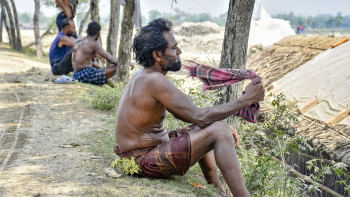
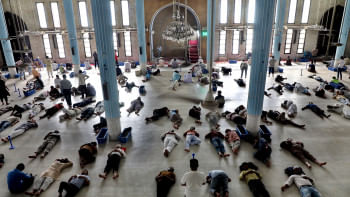

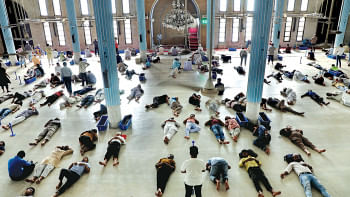



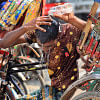



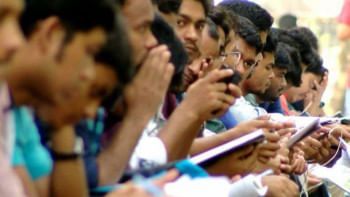
Comments